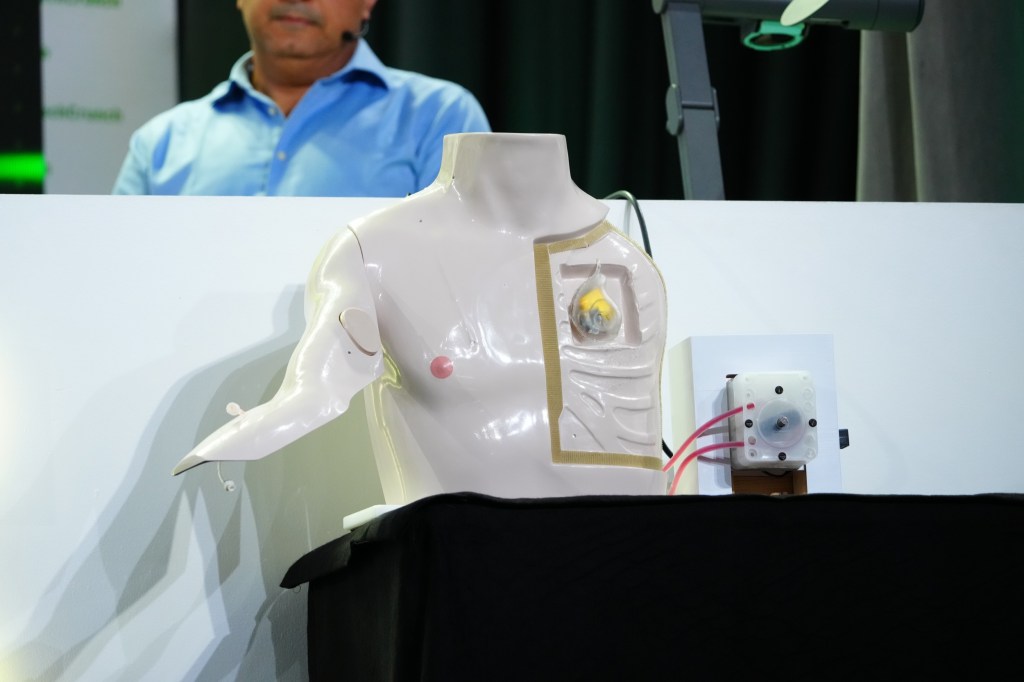Meet NXgenPort, a Saint Paul, Minnesota-based startup that’s looking to remotely monitor cancer patients in between doctor visits using a port catheter. NXgenPort, which presented today at TechCrunch Disrupt Startup Battlefield, is building an implantable chemo port that features added sensors and remote connectivity functions. The port combines chemo-port efficacy with sensor technology to measure and remotely monitor early onset of complications by reporting and tracking patient response over the course of their treatment. The goal of the port is to alert physicians to signs of infection, reduce hospitalizations and gather important physiological data to improve patient outcomes.
NXgenPort is the brainchild of CEO and co-founder Cathy Skinner, who came up with the idea for the port based on her own experience after her father passed away from cancer 20 years ago. His diagnosis sent Skinner on a course to work in the oncology space and become a cancer exercise specialist. In 2016, she was working with a breast cancer patient and noticed that her condition had worsened from the last time Skinner saw her. The patient went to her doctor and learned that the medication she was taking to fight the cancer was also damaging her heart.
“When she was telling me the story, I saw that she had an implanted chemo port in her chest for the drug, and I wondered, how come we couldn’t know sooner that the drug was damaging her heart,” Skinner told TechCrunch in an interview. “I always knew that I had a good idea, but I needed a team to build around it.”
That’s when NXgenPort COO Rosanne Welcher, PhD and CTO Mohamed Ali MD, PhD came into the picture. In 2019, Skinner was at a conference at Harvard and sat next to Welcher for lunch and the two began discussing their professions. Once Skinner found out that Welcher was a scientist with 25 years of experience working in cancer diagnostics and leadership, she shared her idea for the NXgenPort. Skinner and Welcher then formed the company in May 2020 and filed a non-provisional patent with an attorney in Utah. Their attorney had hired Ali to create drawings of the product for the patent, after which Ali shared his interest in the product and joined their team with his expertise in rehabilitative science and cardiac care.
The NXgenPort is embedded with micro electronics and a battery. The device has optical sensors going through the catheter. Once the port is implanted in the chest and the catheter goes through a patient’s heart, the device captures images of blood cells and then compresses the data and sends it to the cloud, after which it is analyzed via machine learning. Skinner notes that cells are differentiated by their size and composition, so the company has trained the algorithm to count the different cells and then provide trends as to whether blood cells are changing in a good or bad way.
“With the chemotherapy port being implanted and then with us embedding with technology for remote patient monitoring, we’re able to detect changes in red blood cells and white blood cells, cardiac output and vitals,” Skinner said. “Right now, if a patent needs to determine if they are eligible for their next chemo appointment, they have to drive to the clinic and get their blood tested. And if their blood cell counts are off, they’re ineligible and have to drive back home. We’re monitoring remotely and showing trends over time and seeing if the data shows signs of infection, if patients need to come in early for a blood transfusion or if chemo needs to be rescheduled.”
NXgenPort is still in the process of receiving FDA approval, so the company can’t test on humans yet. The startup is going into animal testing this year, and is starting with swine. Skinner says the startup anticipates human testing to begin toward the end of 2025.
“It’s a very hard and ambitious thing that we’re seeking to do by taking optical sensors that are used in labs to count cells, miniaturizing them and having them be activated in blood flow,” Skinner said. “So we’re facing some important challenges, but at the same time, when we accomplish this, it’s going to completely change how cancer patients are monitored. The timing when we come to market in 2025 will be well-suited because Hospital at Home models will be more mature and we’ll be ready to integrate.”
In terms of funding, the startup closed a pre-seed round in March 2022 that included investment from the co-founders’ friends and family, mHUB accelerator and Edward-Elmhurst Health Ventures. NXgenPort is in the midst of raising a $4 million seed round, but is currently unable to disclose the lead investor. The company’s Series A investment round, which Skinner says will consist of $10 million, will occur in 2023.
As for the company’s business model, Skinner says the startup will look at licensing the technology to port manufacturers, pharmaceutical manufacturers and virtual clinic trial companies. The NXgenPort itself will cost a bit more than a standard port, which is usually priced at around $270. In addition to the hardware, the startup will have a subscription model for its software that will collect and analyze results for physicians. Skinner says the software will be priced at around $40 or $50 per month and will be payable to the hospitals administering the ports.
Although the startup is currently focused on cancer, Skinner says the startup aims to turn into an umbrella company with different product lines in the future. The startup sees opportunities in having implanted devices with optical sensors collecting patient blood counts and heart function in dialysis, cardiac care and veterinary care.



































Comment